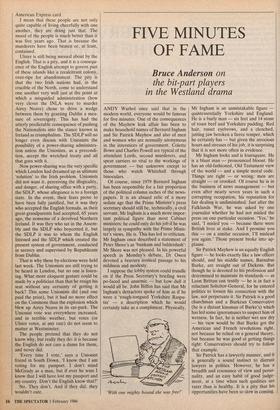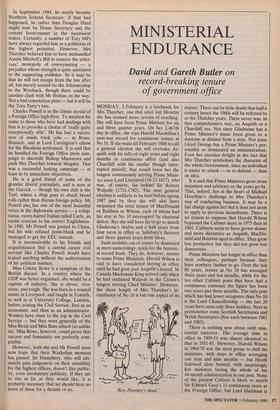FIVE MINUTES OF FAME
Bruce Anderson on
the bit-part players in the Westland drama
ANDY Warhol once said that in the modern world, everyone would be famous for five minutes. One of the consequences of the Mayhew leak affair has been to make household names of Bernard Ingham and Sir Patrick Mayhew and also of men and women who are normally anonymous in the interstices of government. Colette Bowe and Charles Powell are typical of the attendant Lords, second murderers, and spear carriers so vital to the workings of government — but unknown except to those who watch Whitehall through binoculars.
Of course, since 1979 Bernard Ingham has been responsible for a fair proportion of the political column inches of the news- papers. It is an absurd relic of a more sedate age that the Prime Minister's press secretary should still be, technically, a civil servant. Mr Ingham is a much more impor- tant political figure than most Cabinet ministers: he could only do his job if he was largely in sympathy with the Prime Minis- ter's views. He is. This has led to criticism. Mr Ingham once described a statement of Peter Shore's as 'bunkum and balderdash': Mr Shore was not pleased. In his powerful speech in Monday's debate, Dr Owen devoted a bravura ironical passage to his mildness and modesty.
I suppose the lobby system could trundle on if the Press Secretary's briefing were po-faced and anaemic — but how dull it would all be. John Biffen has said that Mr Ingham's detractors spoke of him as if he were a 'rough-tongued Yorkshire Raspu- tin' — a description which he would certainly take as a compliment. Physically,
'With one mighty bound she was free!'
Mr Ingham is an unmistakable figure quintessentially Yorkshire and England. He is a burly man — six feet and 14 stone of roast beef and Yorkshire pudding, Red hair, russet eyebrows, and a clenched, jutting jaw betoken a fierce temper, which he certainly has — but given the atrocious hours and stresses of his job, it is surprising that it is not more often in evidence.
Mr Ingham looks and is foursquare. He is a blunt man — pronounced bloont. He has an old-fashioned, Old Testament view of the world — and a simple moral code. Things are right — or wrong: men are straight — or crooked. Of course he is in the business of news management — but even after nearly seven years in such a corrupting occupation, his reputation for fair dealing is undiminished. Just after the Falklands War, he was asked by one journalist whether he had not misled the press on one particular occasion. 'Yes,' he said, 'I misled you — because there were British lives at stake. And I promise you this — on a similar occasion, I'll mislead you again.' Those present broke into ap- plause.
Sir Patrick Mayhew is an equally English figure — he looks exactly like a law officer should, and his middle names, Barnabas Burke, are straight out of Dickens. But though he is devoted to his profession and determined to maintain its standards — as Leon Brittan can testify — he is in fact a reluctant Solicitor-General, for he entered politics to loosen his connection with the law, not perpetuate it. Sir Patrick is a good churchman and a Burkean Conservative (he is a distant kinsman of Burke's) which has led some ignoramuses to suspect him of wetness. In fact, he is neither wet nor dry — his view would be that Burke got the American and French revolutions right, not because he relied on a general theory, but because he was good at getting things right: Conservatives should try to follow that example.
Sir Patrick has a lawyerly manner, and it is generally a sound instinct to distrust lawyers in politics. However, he has a breadth and resonance of view and perso- nality, and an easy habit of good judge- ment, at a time when such qualities are rarer than is healthy. It is a pity that his opportunities have been so slow in coming. In September 1984, he nearly became Northern Ireland Secretary: if that had happened, he rather than Douglas Hurd might now be Home Secretary and the current front-runner in the succession stakes. Certainly, a number of Tory MPs have always regarded him as a politician of the highest potential. However, Mrs Thatcher believed him to have mishandled Austin Mitchell's Bill to remove the solici- tors' : monopoly of conveyancing — a prejudice whose strength is quite unrelated to the supporting evidence. So it may be that he will not escape from the law after all, but merely ascend via the Attorneyship to the Woolsack, though there could be another clash with Mr Brittan on the way. Not a bad consolation prize — but it will be the Tory Party's loss.
Charles Powell is in the classic mould of a Foreign Office high-flyer. To mention his name to those who have had dealings with him is to provoke a chorus of 'really quite exceptionally able'. He has had a succes- sion of inside track jobs — in Bonn, Brussels, and at Lord Carrington's elbow for the Rhodesia settlement. It is said that he handled the Foreign Office press cam- paign to discredit Bishop Muzorewa and push Mrs Thatcher towards Mugabe. That was a successful leaking campaign — at least in its immediate objectives.
He is a good friend of some of the grander liberal journalists, and is seen at the Garrick — though his own club is the Turf, where a chap goes to chuck bread rolls rather than discuss foreign policy. Mr Powell also has one of the most beautiful wives in the diplomatic service — a volup- tuous, raven-haired Italian called Carla, an exotic contrast to his correct Englishness. In 1980, Mr Powell was posted to China, but his wife refused point-blank and he managed to get the EEC instead.
It is inconceivable to his friends and acquaintances that a careful career civil servant like Charles Powell would have leaked anything without the authorisation of his political masters.
Miss Colette Bowe is a symptom of the British disease. In a country where the GDP was better organised, she would be a captain of industry. She is clever, viva- cious, and tough. She was born in a council estate in Liverpool, and taught in Toxteth, as well as at University College, London, before joining the Civil Service, first as an economist, and then as an administrator.
Women have risen to the top in the Civil Service — but they were generally of the Miss Beale and Miss Buss school (so unlike Us). Miss Bowe, however, could prove that success and femininity are perfectly com- patible.
However, both she and Mr Powell must now hope that their Warholian moment has passed. Sir Humphrey, who will ulti- mately pass judgement on their suitability for the highest offices, doesn't like public- ity, even involuntary publicity. If they are to rise as far as they would like, it is probably necessary that we should hear no more of them for a decade or so.















































 Previous page
Previous page